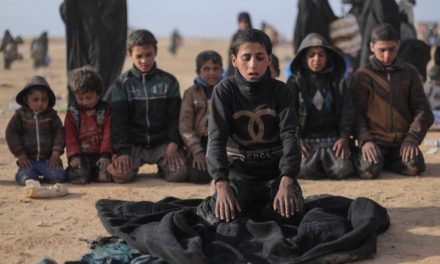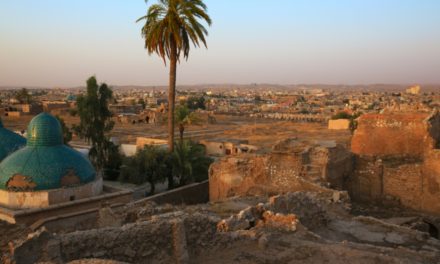In June last year, Mosul, the capital of Nineveh province and Iraq’s largest Sunni city, fell to ISIS militants. The widespread belief in the United States and the west was that the Prime Minister at the time, Nouri al-Maliki, had spent eight years marginalizing Iraq’s Sunni minority, resulting in the Mosul disaster. The argument went that conditions were so awful for Sunnis that he forced them to regard ISIS as the better option compared to the Iraqi government. In other words, the only blame for the fall of Mosul lay at the feet of the former Prime Minister.
Nearly a year later, with a new prime minister and an inclusive government of Shia, Sunnis and Kurds, the next largest Sunni capital of Ramadi fell. How is this possible? Maliki was no longer in power to marginalize Sunnis and force them into arms of ISIS. Abadi finally filled the defense and interior minister positions, something Maliki failed to do during his second term. The country again has a President, who is not only Kurdish but also Sunni. The Sunnis also kept their leadership position of Parliament Speaker. The government was inclusive just the way the United States conditionally wanted it to be and was so confident that this was the formula that would quell Sunni feelings of disenfranchisement. The fall of Ramadi has once again shown this is not the cause behind ISIS support and gains in Sunni areas of Iraq. The fact is, Sunnis have yet to accept the reality post-2003 that they are a minority that no longer rules Iraq exclusively. This leads to short-sighted and criminal behaviour, including piggybacking on the likes of ISIS in the faint hope of regaining their former status.
This is not to say, that the change of premiership was not healthy for Iraq’s infant democracy. On the contrary, Haidar al-Abadi has been more balanced in his handling of affairs and is a much more competent commander in chief. Maliki let the nation down due to the corruption and mishandling of the Iraqi armed forces, to say the least. After a decade of U.S. training, the response to Mosul should have been different. However, no amount of force and strength could have stopped Mosul from falling because the Iraqi Sunni populace wanted it to. The sooner this important point is understood, the better the situation can be analyzed and solved.
The fall of Ramadi defeated any narrative of Sunni marginalization and only further supported the claim that Sunni disenfranchisement is caused by the loss of power and no inclusive “national unity” government will solve such a denial issue in the near future.
The argument raised then is that the Shia-led government in Iraq is not willing to arm the Sunnis and therefore they cannot defend themselves from ISIS, hence Ramadi fell nearly a year after Mosul did. In fact, Sunnis and Kurds are represented in the military leadership in greater numbers than their demographic weight in the country. The Sunni Minister of Defense and Kurdish head of the Iraqi Army are just two of numerous examples. Former brigadier general and military attaché of Iraq to the United States, Ismael Alsodani provides a list of high-ranking appointees in Iraq’s Defense Ministry.
To put it bluntly, Sunnis are already armed and are leading operations against ISIS through their participation in the Iraqi Army. To illustrate the arming of Sunnis in case there are any doubts, Prime Minister Abadi went to Habbaniya in April and personally armed Sunni Iraqis, part of ISF, with rifles. Sunnis are being recruited, trained and armed in the thousands. Second, with regards to the lobbying taking place to arm Sunni tribes, bear in mind that these same tribes had no issues with arms when 1,335 U.S. and countless Iraqi service members were killed in Anbar province since 2003. This figure is second only to Baghdad, which holds nearly a quarter of the population and saw some of the worst insurgent violence during U.S. occupation.
The next case being made is that the Americans paid those same Sunni tribes that murdered over a thousand U.S. troops to join them and fight the ISIS predecessor, Al-Qaida. Why would the Iraqi government make the same mistake as the United States and pay someone to fight for their own province? Tens of thousands of Iraqi Shia from the south volunteered in droves to fight for their country, despite being from other, safer provinces.
Sunnis not only hold significant high positions in the Iraqi Security Forces, they hold large numbers in both ISF and PMU forces. Prime Minister Abadi ordered the halt of all aerial bombardments on residential areas under ISIS control, giving Sunni civilians no reason whatsoever to take up arms against the state in addition to arming them to fight with the state.
These are simple facts that the United States and the west seem unable to comprehend when analyzing and addressing the ISIS problem. Historical mistakes, especially from recent years must not be repeated. All of Iraq must be liberated from ISIS and God-willing it will be. The eradication of ISIS must be done correctly, not through band-aid solutions like bribery that would only provide Sunni communities with another opportunity to turn on the state and hold it ransom. Those are not the actions of a marginalized community but of traitorous countrymen who will stop at nothing to rid us of democracy and send us back to dictatorship.










